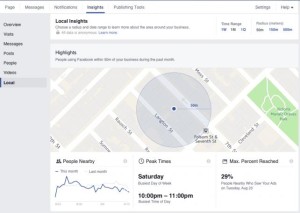Last November Facebook launched a new initiative that lets businesses see how many Facebook users are in the vicinity of retail stores. Now, Facebook also lets businesses know the percentage of those passerby that may have seen the brand’s ad on the social media platform within the past month. Available for free to any business that advertises on Facebook and uses the page’s location features, the initiative comes in the form of a new local insights tab within Facebook’s page. On the tab, Facebook provides trend information, rather than the actual number of people that passed near a store, allowing businesses to see when particular groups of people are more or less likely to be nearby business locations and what times of the day or days of the week are the busiest in the neighborhood. That information includes breakdowns by age and gender, as well as whether people are from out of town or live within 200 kilometers of a store’s location. Facebook users who do not want the company to gather this type of location information about them can turn off the location tracking by clicking on account settings and then location settings.
The desire among businesses to collect information on consumers is not new. Duhigg (2012) posits that large retailers like Target, for example, have been collecting vast amounts of data on customers from basic demographic information to the kind of topics they talk about online for years. The company’s goal: to understand consumer’s shopping and personal habits in order to market to them more efficiently.
Thanks to social media platforms businesses can gather even more insights into consumer’s habits to expand sales. Insights, according to Young (2014, p. 64), help creative agencies decide what to say in advertising, on the one hand, and help the agency creative people develop ideas and ads that connect with their targets, on the other. With Facebook’s latest geolocation initiative, companies will likely be able to generate even more compelling insights and therefore even more customized and targeted marketing campaigns unique to each audience to drive in-store traffic.
Despite its advantages for businesses, Facebook’s local insights tab does pose a number of ethical dilemmas. Should Facebook disclose users’ GPS tracking to businesses? Should businesses let Facebook users know they are tracking consumers’ locations to gather insights on them? How can businesses market more efficiently to consumers without letting them know they’re studying their lives? These are only a few of the questions businesses should contemplate when deciding to use geo-location data to reach their target audience.
References
Duhigg, C. (2012, February 16). How companies learn your secrets. The New York Times Magazine. Retrieved from http://www.nytimes.com/2012/02/19/magazine/shopping-habits.html?_r=0
Facebook now helps businesses see how many shoppers are nearby. (2016, February 24). Ad Age. Retrieved from http://adage.com/lookbook/article/social-media/facebook-helps-businesses-shoppers-nearby/302482/
Young, A. (2014). Brand media strategy: Integrated communications planning in the digital era. New York, NY: Palgrave Macmillan.



3 Responses to Facebook Provides Businesses Location-Tracking Data